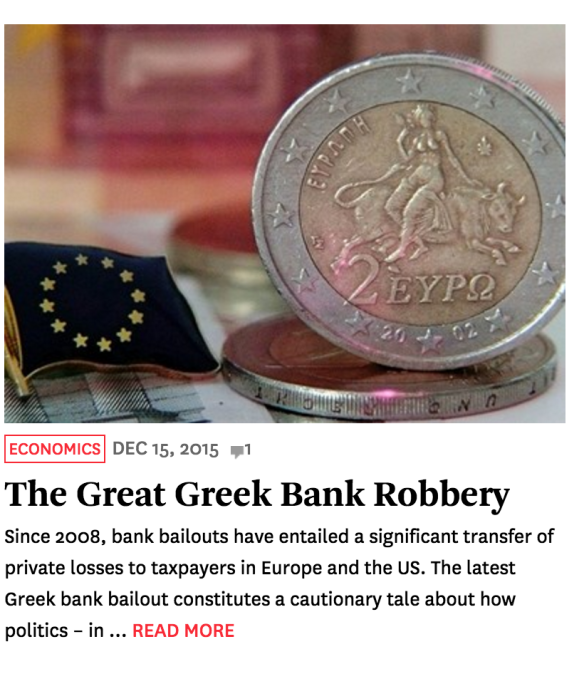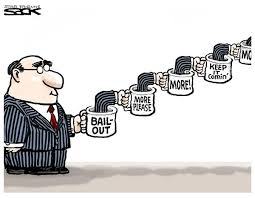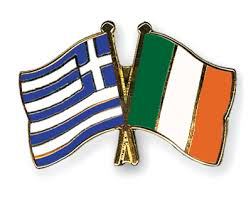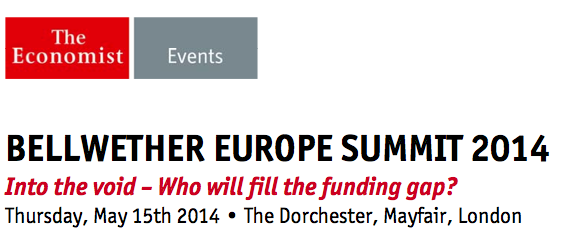Category Archives: Banking Crisis
The Labour Party’s 2016 NEW ECONOMICS lecture series: Mazzucato, Stiglitz, Varoufakis, Ha-Joon Chang et al
The UK’s Shadow Chancellor, John McDonnell, is convening a series of public lectures to broaden the debate around economics in Britain.

Greece’s two currencies – Project Syndicate Op-Ed

ATHENS – Imagine a depositor in the US state of Arizona being permitted to withdraw only small amounts of cash weekly and facing restrictions on how much money he or she could wire to a bank account in California. Such capital controls, if they ever came about, would spell the end of the dollar as a single currency, because such constraints are utterly incompatible with a monetary union. Greece today (and Cyprus before it) offers a case study of how capital controls bifurcate a currency and distort business incentives. The process is straightforward. Once euro deposits are imprisoned within a national banking system, the currency essentially splits in two: bank euros (BE) and paper, or free, euros (FE). Suddenly, an informal exchange rate between the two currencies emerges. Read more here
The Great Greek Bank Robbery – Project Syndicate Op-Ed
 Click on the icon above or here
Click on the icon above or here
Britain, Greece & the Struggle for a Decent Future – Emmanuel Centre, London, 14th September 2015
Jump to 1:04:50 for my address
Varoufakis and Tsakalotos on the Eurozone institutions and bank bailouts – INET-OECD April 9th 2015
Two SYRIZA ministers for the price of one! Here you can find audio of our talks at the INET-OECD 9th April conference on the subject of ‘Eurozone institutions during the bank bailout negotiations’.
Yanis Varoufakis’ talk below
Euclid Tsakalotos talk below
Burst Greek Bubbles, Spooked Fund Managers: A cause for restrained celebration
 The international press is replete with reports of how London-based fund managers were spooked when they heard of SYRIZA’s views on the nature of Greece’s conundrum and on the party’s intention to work towards a debt restructure and a re-orientation of social and economic policies toward social cohesion and economic growth. Here is my reply… Continue reading
The international press is replete with reports of how London-based fund managers were spooked when they heard of SYRIZA’s views on the nature of Greece’s conundrum and on the party’s intention to work towards a debt restructure and a re-orientation of social and economic policies toward social cohesion and economic growth. Here is my reply… Continue reading
Today’s Eurozone seen from an investor’s perspective – Keynote (audio)
 On 30th October I was invited to address a meeting of German, Austrian and Swiss pension fund managers on how they should make sense of the Eurozone’s current state of play. In this keynote (click below for the audio and the accompanying slides) I present an explanation of the causes underlying the impossible dilemmas pension fund and fixed income managers are facing in Europe today. Plus a proposal of what the ECB ought to do to make a substantial difference.
On 30th October I was invited to address a meeting of German, Austrian and Swiss pension fund managers on how they should make sense of the Eurozone’s current state of play. In this keynote (click below for the audio and the accompanying slides) I present an explanation of the causes underlying the impossible dilemmas pension fund and fixed income managers are facing in Europe today. Plus a proposal of what the ECB ought to do to make a substantial difference.
For the keynote’s audio click below and, once its starts, open Zurich Powerpoint (and click to change slides when you hear the gong in the background)
ECB stress tests: The view of an insider – Guest post by Klaus Kastner
 Klaus Kastner is a former banker from Austria who is also ‘afflicted’ with a deep concern for Greece; witness his excellent blog ObservingGreece. He has commented many times on this blog and, on the occasion of the ECB’s recent stress tests (and in response to this post) he sent me the following comment. His first hand experience of European banks renders is both useful and interesting. Read on… Continue reading
Klaus Kastner is a former banker from Austria who is also ‘afflicted’ with a deep concern for Greece; witness his excellent blog ObservingGreece. He has commented many times on this blog and, on the occasion of the ECB’s recent stress tests (and in response to this post) he sent me the following comment. His first hand experience of European banks renders is both useful and interesting. Read on… Continue reading
Discussing the ECB’s stress tests on ‘Boom Bust, RT tv
The ECB’s Stress Tests and our Banking Dis-Union: A case of gross institutional failure
 Last Sunday the ECB published its quality assurance results, its stress tests of our systemic banks. It was, from where I am standing, a sad day.
Last Sunday the ECB published its quality assurance results, its stress tests of our systemic banks. It was, from where I am standing, a sad day.
Continue reading
Another shady Greek banking deal: An exchange with Klaus Kastner on the Pireus-MIG deal
 The sordid relationship between the owners of the Bank of Pireus and MIG (a holding company that used to own one of the two failed Cypriot banks, as well as a swathe of Greek companies) is well documented. Recently we witnessed a new chapter in this saga, one that went almost unnoticed and which was quietly condoned (like all recent scandals) by the Athens government and the troika. Klaus Kastner blogged on this deal in a highly informative recent post, entitled MIG: A great place to invest €250 million?, and also sent me an email with the following question/point: “It baffles my mind how a bank like Piraeus where the state has part-ownership would buy €250 million convertibles of the holding company of a group which is as shaky as the MIG Group (unless, of course, the 250 MEUR were used to repay loans to Piraeus). MIG may have operating companies of operational worth and market prominence but the whole group is built on hot air and, at least for the time being, the operating companies are incurring horrendous losses.” My answer to Klaus follows… Continue reading
The sordid relationship between the owners of the Bank of Pireus and MIG (a holding company that used to own one of the two failed Cypriot banks, as well as a swathe of Greek companies) is well documented. Recently we witnessed a new chapter in this saga, one that went almost unnoticed and which was quietly condoned (like all recent scandals) by the Athens government and the troika. Klaus Kastner blogged on this deal in a highly informative recent post, entitled MIG: A great place to invest €250 million?, and also sent me an email with the following question/point: “It baffles my mind how a bank like Piraeus where the state has part-ownership would buy €250 million convertibles of the holding company of a group which is as shaky as the MIG Group (unless, of course, the 250 MEUR were used to repay loans to Piraeus). MIG may have operating companies of operational worth and market prominence but the whole group is built on hot air and, at least for the time being, the operating companies are incurring horrendous losses.” My answer to Klaus follows… Continue reading
Is Europe Reforming? At the Bellwether Economist Conference
On 15th May, the Bellwether Economist Conference (see program) posed the broader question “Who will fill the funding gap?” and the narrower but crucial question “Is Europe Reforming?” In this post the reader can find/hear my contribution in lieu of an answer to the second question, as well as to questions on how the ECB should practise quantitative easing, how the Greek debt crisis ought to have been handled etc. Continue reading
How the Greek Banks Secured an Additional, Hidden €41 billion Bailout from European taxpayers
 In 2013 Greek taxpayers borrowed from the rest of Europe’s taxpayers €41 billion to pump into the Greek banks. This is well known. What is not known is that, also in 2013/4, the Greek banks received an additional, well hidden, €41 billion bailout loan from Greek and European citizens. This bailout was never authorised by any Parliament or even discussed in public anywhere in Europe.
In 2013 Greek taxpayers borrowed from the rest of Europe’s taxpayers €41 billion to pump into the Greek banks. This is well known. What is not known is that, also in 2013/4, the Greek banks received an additional, well hidden, €41 billion bailout loan from Greek and European citizens. This bailout was never authorised by any Parliament or even discussed in public anywhere in Europe.
Continue reading
Europe’s slide into deflation, and what to do about it – Interviewed for Jornal de Negócios by Jorge N. Rodrigues
 Europe is in the clasps of the deflationary forces that resulted directly from its inane handling of the Eurozone crisis. In this interview, I discuss deflation and low-flation and suggest a particular form of quantitative easing that, unlike the Fed’s or the Bank of England’s QE, will not reinflate the bubbles of the financial sector but, instead, will help recycle idle savings into productive investments in Europe’s real economy. Continue reading
Europe is in the clasps of the deflationary forces that resulted directly from its inane handling of the Eurozone crisis. In this interview, I discuss deflation and low-flation and suggest a particular form of quantitative easing that, unlike the Fed’s or the Bank of England’s QE, will not reinflate the bubbles of the financial sector but, instead, will help recycle idle savings into productive investments in Europe’s real economy. Continue reading
EUROBANK: Another scandal re-packaged as part of the Greek Success Story
 Eurobank is an apt example of Greek ingenuity. Its name is a coup in itself.[1] Beyond semantics, however, and coming to recent developments, Eurobank is a wonderful example of the Greek establishment’s ingenious efforts to defraud Greek and European taxpayers, and then to proclaim a glorious Greek Success Story, weeks before the European Parliament elections. (You have already seen, here, the other plank of this campaign, also known as the Greek primary ‘surplus’…) Continue reading
Eurobank is an apt example of Greek ingenuity. Its name is a coup in itself.[1] Beyond semantics, however, and coming to recent developments, Eurobank is a wonderful example of the Greek establishment’s ingenious efforts to defraud Greek and European taxpayers, and then to proclaim a glorious Greek Success Story, weeks before the European Parliament elections. (You have already seen, here, the other plank of this campaign, also known as the Greek primary ‘surplus’…) Continue reading
‘European Progressive Policy Initiative’ endorses the Modest Proposal’s four main policies
 A group of noted international economists (including Joseph Stiglitz, Peter Bofinger and Stefanie Griffith-Jones), known as the European Progressive Policy Initiative (EPPI), has issued a policy paper that endorses the main planks of our Modest Proposal for Resolving the Euro Crisis 4.0.
A group of noted international economists (including Joseph Stiglitz, Peter Bofinger and Stefanie Griffith-Jones), known as the European Progressive Policy Initiative (EPPI), has issued a policy paper that endorses the main planks of our Modest Proposal for Resolving the Euro Crisis 4.0.
EPPI was assembled in 2013 by Europe’s social democratic alliance in the European Parliament. This is significant, given the social democrats acquiescence to the Merkel-led toxic policies, which are causing Europe to fragment. Coming, as it does, a few weeks before the European Parliament Election, this policy document flags the potential for breaking the stranglehold over European politics of the indefensible ‘official EU position’, i.e. the toxic trio of claims that: Europe is on the mend – Austerity is working – Europe has taken important steps in shoring up the Eurozone’s institutions).
Continue reading
The Grand Greek Paradox: Bankrupt but embraced by the money markets – On the BBC World Service
 (listen to the first story; first 15′)
(listen to the first story; first 15′)
Greece is about to issue 5 year bonds again. Berlin, Brussels, Frankfurt and Athens are celebrating Greece’s recovery. For my part, I think (and tell the BBC World Service) that this is a sad day for Greece and it is a sad day for Europe. Why do I refuse to be impressed and join in the celebrations? It is because the Greek state and the Greek banks remain deeply insolvent. And, their return to the money markets is a harbinger of the next terrible phase of Greece’s crisis, rather than a cause for celebration. Continue reading
Europe’s latest policy on Irish and Greek banking losses: A tale of two swindles too similar for comfort
 The Irish and the Greeks are, in many ways, very different people. And yet, caught up in the Euro Crisis, our fortunes have become too close for comfort. Recently, European authorities have devised a creative new method for damaging the people of Ireland and of Greece further. The new method involved imposed changes on the public financing of bank recapitalisations that shift even greater burdens on taxpayers and on the weaker members of our societies. This article examines the changes and answers the pertinent question: Why is Europe doing this?
The Irish and the Greeks are, in many ways, very different people. And yet, caught up in the Euro Crisis, our fortunes have become too close for comfort. Recently, European authorities have devised a creative new method for damaging the people of Ireland and of Greece further. The new method involved imposed changes on the public financing of bank recapitalisations that shift even greater burdens on taxpayers and on the weaker members of our societies. This article examines the changes and answers the pertinent question: Why is Europe doing this?
Think Big, Think Bold
 Why the Left in Britain and in the Eurozone must aim for a radical Pan-European Green New Deal
Why the Left in Britain and in the Eurozone must aim for a radical Pan-European Green New Deal
The Centre for Labour and Social Studies (CLASS) kindly invited me to draft a possible Manifesto for the European Left, in view of the May 2014 European Parliament election. Here is the final document I produced entitled THINK BIG, THINK BOLD: Why the European Left must aim for a radical, Pan-European, Green New Deal.


